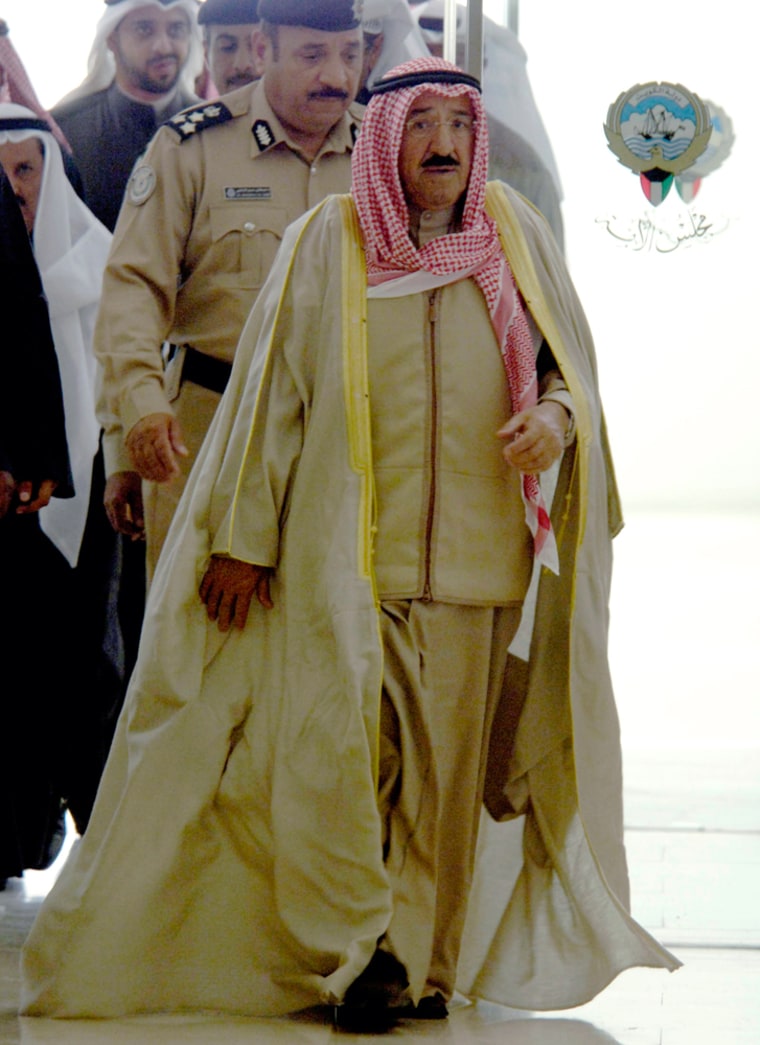The Cabinet moved swiftly Tuesday night to fill Kuwait’s leadership void by naming the prime minister to take over as emir, just hours after the ailing ruler was ousted by parliament.
In removing Sheik Saad Al Abdullah Al Sabah as emir in an unanimous vote, parliament handed temporary power to the government of Sheik Sabah Al Ahmed Al Sabah, the prime minister and half brother of the longtime ruler, who died Jan. 15.
Justice Minister Ahmed Baqer said the Cabinet meeting to name the new emir took place in Sheik Sabah’s residence.
The appointment of Sheik Sabah, de facto leader of the oil-rich U.S. ally for several years, was widely expected and now goes to parliament for approval. He has broad support in the legislature, where the appointment needs only a simple majority vote.
It was not clear when parliament would convene.
Sheik Sabah had been running the day-to-day affairs of the country since the late emir, Jaber Al Ahmed Al Sabah, and the then-crown prince, Sheik Saad, both fell ill.
The unprecedented vote Tuesday by the Kuwaiti legislature came just moments before it received a letter of abdication from Sheik Saad, said parliament speaker Jassem al-Kharafi.
“The house listened to the emir’s medical report and it became evident to the house, beyond any doubt, to transfer the emir’s responsibilities permanently,” al-Kharafi told a news conference.
“The emir remains in the hearts of all Kuwaiti people. We all love, appreciate and respect him, but this is God’s will. We can only wish him a quick recovery,” al-Kharafi added.
Unanimous decision
All 65 legislators and Cabinet ministers who attended the legislative session had voted in favor of deposing the emir, al-Kharafi said.
Legislator Mohammed Jassem al-Saqr told Al-Arabiya TV that Tuesday was a “black day in Kuwait’s political history,” but one that also proved the country’s commitment to its constitution.
“I don’t think there is any other Third World state that has shown the respect for constitution and law that we have displayed today,” he said.
Ahmed al-Rubei, a former minister and a liberal newspaper columnist, told Kuwait TV, the way the country had moved through the crisis proved its “maturity in understanding the democratic process.”
“We’ve done what has never happened in the Middle East,” he said. “If half of this crisis had taken place (somewhere else) in the Middle East, tanks would have rolled in the streets and armed forces would have been asked to be on alert. We didn’t witness any extra security scene or measure.”
Al-Kharafi acknowledged divisions within the royal family over deposing the emir, but denied there had been a leadership crisis.
“We take pride in having followed all our constitutional procedures,” al-Kharafi said. “In spite of our differences, the spirit of brotherhood prevailed.”
‘This was a necessary step’
Comments from lawmakers across the board signaled genuine pride in the way the leadership change was handled.
“This was a necessary step, it was God’s will, and it will not ever take away from our hearts the status of his highness, the emir, but it was a health matter,” lawmaker Ali al-Diqbasi told The Associated Press.
While many members of the family had pushed for Sheik Sabah to take over, a small dissident group had objected. Key among them was Sheik Salem Al Ali Al Sabah, chief of the national guard and the oldest member of the family. His status of family elder lent weight to his objection.
Parliament had scheduled a swearing-in ceremony for Sheik Saad on Tuesday evening, but many Kuwaitis had voiced fears Sheik Saad would be unable to recite the oath of office stipulated by the constitution. Sheik Saad has recently appeared only in a wheelchair and had not spoken in public.
Sheik Jaber suffered a brain hemorrhage in 2001, and Sheik Saad’s health started to deteriorate after he was treated for a colon ailment in 1997.
Both Sheik Saad and Sheik Sabah are in their mid-70s but Sheik Sabah is the more fit of the two. He has a heart pacemaker but otherwise is said to be in good health.
